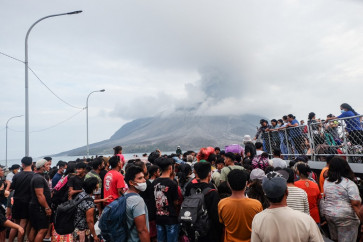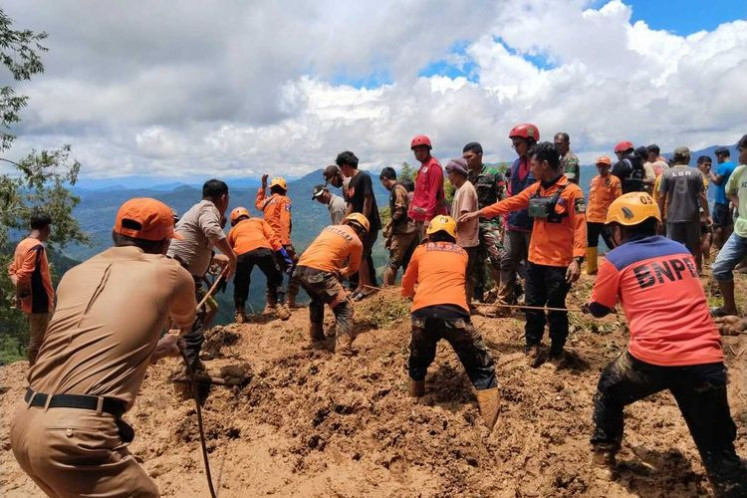Slowdown while airports bulk up security
A string of incidents in Jakarta and Bali has exposed vulnerabilities in airport and airline security
Change Size

A
string of incidents in Jakarta and Bali has exposed vulnerabilities in airport and airline security. The existence of highly active terrorist cells and recent attacks on airports and transportation hubs elsewhere in the world should prompt Indonesia to enhance security in its airports, The Jakarta Post’s
Nani Afrida reports.
Galih Sucipto, 34, feels depressed every time his boss assigns him to fly to their infrastructure company’s branch offices in Kalimantan and Sulawesi. He groans at the sluggish airport services and intrusive security screening and checks, especially at Jakarta’s Soekarno-Hatta International Airport.
“I have to spend what seems like hours at the check-in counter and more hours at the baggage claim area. Queues at the terminal are incredibly long and service is slow.”
For him, the security check procedures are too much to bear. “I can understand why security is of the utmost importance but frankly I doubt the procedure is really effective at reducing the risk of [ordinary] crime and terrorism.”
Galih may be overly unhappy about airport personnel doing their job correctly. Following incidents in Indonesia and abroad, local authorities have had to tighten up security in airports, and this effort understandably results in delays for people checking in.
Indonesia is among the many countries that have bolstered their airport security amid the ongoing terrorist threat. The latest incident was the June 28 attack on the main airport at Istanbul, Turkey, which claimed 41 lives.
Airliners and airports have always been terrorists’ favored targets as incidents in recent years have proven. Last October, a Metrojet on its way from Sharm el-Sheikh in Egypt to St. Petersburg in Russia was brought down by a bomb placed in the baggage hold, killing all 224 people on board. The Islamic State (IS) group claimed responsibility.
In February, a suicide bomber blew a hole in the fuselage of an aircraft in midair over Somalia. In March, the departures hall at Brussels airport was attacked, with 11 people killed and 81 injured.
Indeed Indonesia was subject to air transportation terrorism as long ago as 1981 when extremists of the Komando Jihad group hijacked a domestic Garuda flight with 65 people on board and flew it to Bangkok. Four of the five terrorists, the pilot and one of the Army’s Special Forces soldiers raiding the plane were killed. In 2003, a bomb blast at Soekarno-Hatta’s international terminal injured 10 people.
Terrorism observer Al Chaidar of the University of Indonesia has warned about the vulnerability of airports and airliners to attack. Homegrown terrorists he has met in prisons and radical groups have convinced him that authorities responsible for airport security must remain highly vigilant.
“If they [radicals] have the logistics and weapons, they will do it; it’s a question of timing. Think of ways to minimize casualties,” says Chaidar whose participative studies took him to the underground movement of the Indonesian Islamic State (NII).
Airports are tempting terror targets because access is relatively easy. There is no security screening until passengers enter the check-in area, so weapons and explosives are likely to go undetected. If maximum casualties are the terrorists’ prime goal, then airports are great places to attack.
Besides, authorities should also keep an eye on “insiders” — from security officers to canteen attendants — and make sure that none of them is part of any radical network.
“If terrorists don’t have access to an area, they might use other people who do,” Chaidar says.
Indonesia began to tighten security checks on passengers in November last year with the Transportation Ministry raising the alert status at all airports from the normal “green” by one level to “yellow” in the wake of global terror threats, including attacks in Paris last year.
“Then we received credible information that our airports were on the list of terrorists’ targets and so we took additional security measures,” The Transportation Ministry’s flight security director, Nasir Usman, says.
Now, airport users have to undergo thorough checks upon entering terminals and the authorities have increased patrols. Security officers also regularly check terminal buildings, car parks, cargo areas and access roads.
Besides installing more CCTVs, the government is deploying more military personnel, sniffer dogs and police officers to secure airports. Soekarno-Hatta airport, for instance, is now guarded by 300 military personnel and 100 police.
“We just hope people will be more cooperative about the security procedures because this is for their own good,” Nasir says.
Aside from the terrorism issue, 192 major airports across the country are increasingly overwhelmed by the ever-swelling number of passengers. More affordable air tickets offered by budget airlines have translated into a growing number of domestic flyers. That’s not to mention the steady arrival of foreign nationals allured by Indonesia’s economic and relative political stability.
This rapid user growth is outpacing expansion of existing airports and necessitates the construction of new ones — all adding heavy pressure to services, safety precautions and security systems.
------------
Regulations on aviation security upgrade
• Operators to raise level alert from “green” to “yellow”.
• “Yellow” means airport has to follow security program.
• Operators to conduct security checks on all vehicles entering airport.
• Local government must take responsibility for security of VIP building at airport. If building does not have security equipment passengers should be checked at departure terminal hall before entering VIP building.
• Operators to conduct intensive security patrols at airport.
• Operators to cooperate with military and police while implementing basic principles of aviation safety.
• Operators to increase security checks of cargo and baggage using sniffer dogs.
• Operators to hold meeting with airport security committee.
• Security inspectorate of airport authority to be accompanied by intelligence
officers.
• Operators to be subject to legal sanctions in event of security violations that
endanger passenger safety.
Source: Transportation Ministry
-----------
Recent incidents have exposed the vulnerability of our airports. Last year, in a bizarre sign of slack airport security, a 21-year-old man managed to sneak onto an airport in Pekanbaru, Riau, and fly to Jakarta inside the wheel well of a Garuda aircraft. Jakarta airport authorities were surprised that Mario Steven Ambarita survived the uncomfortable one-hour, 40,000-feet flight but Pekanbaru’s Syarif Hasim II airport chief lost his job for “negligence”.
The most recent incidents occurred in May, in Jakarta and Bali, when airport buses inadvertently dropped dozens of international passengers at the domestic arrival terminals.
In Jakarta, the incident, involving a Lion Air flight, would have gone unnoticed had not writer Zara Zettira, whose daughter was one of the passengers, revealed it on her Facebook status. She gave the chronology of the event and questioned the airport security systems.
A week later, a similar incident happened at Ngurah Rai International Airport in Bali this time involving Indonesia AirAsia, the local arm of Malaysian budget carrier AirAsia. In the second incident, thoughtful passengers voluntarily reported to the immigration office the following day.
The wrong-terminal mishaps sparked a national outcry over airport security.
Former Air Force chief of staff Chappy Hakim has described the incidents as “gravely dangerous”. “Such incidents have happened only in Indonesia and they show that we don’t have good aviation management.”
But the Transportation Ministry played them down, calling the incidents mere “service mishaps” despite the security risks.
A subsequent investigation by the Transportation Ministry found that Lion Air and IAA employed third-party companies for their ground-handling management in both Soekarno-Hatta and Ngurah Rai.
The airlines, however, failed to ensure that their partner companies delivered the necessary standards of service.
The incidents exposed the vulnerability of all Indonesian airports, as lawmaker Fairy Djemi Francis fears.
“Soekarno-Hatta and Ngurah Rai are the standard bearers in terms of airport security. If security lapses can happen there, they can also occur elsewhere,” Fairy says.
Management and law enforcement are classic issues in the Indonesian aviation industry in the face of fast passenger growth. Today, airline companies operate around 1,300 commercial aircraft, up from 800 in 2013. Meanwhile the number of passengers continues to grow by double digits.
Punishing the airlines is not a good option because, as aviation expert Gerry Soejatman believes, it will only be counter-productive to the airlines’ services.
“We don’t have a system that can prevent such things from happening again,” he said.
In fact, airports in Indonesia do not have common security standards. Each airport has its own standards despite government regulations.
“Many airports, especially those outside Java, do not have standard security procedures. People and local residents’ loose livestock can enter airports freely, posing safety risks,” aviation expert Alvin Lie says.
Airport authorities need also to standardize and tighten security checks not only on passengers, but also of staff, including ground-handling staff.
The incidents occurred amid Transportation Ministry efforts to improve aviation safety standards. Indonesia has been stuck in “category 2” in the US Federal Aviation Administration’s (FAA) aviation safety classification, which means that the country lacks regulations necessary to oversee air carriers in accordance with minimum international standards.
Airport operator Angkasa Pura II is now busy mending weaknesses, such as improving coordination and boosting human resources. The focus is on poor coordination among the various related parties: the airport authority, immigration, customs and excise, the intelligence unit, the military and the police.
“We have to admit that egoism has hampered coordination among these institutions,” Angkasa Pura II president director Budi Karya says.
As a member of the International Civil Aviation Organization (ICAO), Indonesia has incorporated international aviation standards into Government Regulation No. 127/2014 on the national aviation program, which stipulates that all aviation institutions, including airlines and airport operators are obliged to maintain strict security standards.
It is long past time to put higher security standards into practice without compromise.









